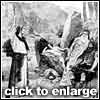
|
Part One: History of Children 1200-1800 By Brian Orr Have a question? Click Here to go to Brian's own Discussion Board!
Sadly it seems that while time has provided many exanples from which to learn from mistakes, man has ignored the inhumanity to his own flesh and blood and merely extended the stage upon which to play out their suffering....and suffer they did from the earliest times despite the best endeavours of the reformers to generate a social conscience and the practical ministrations of the kirk. The practice of Christian charity in Scotland was promoted by St. Columba who in one of his Runes or mystic sayings told of Christ the stranger who came to test the charity and hospitality of man. There were also efforts from the earliest times to alleviate the poverty such as the Hospital of St. Mary of Lochleven, created by the Bishop of St Andrews in 1214. But the fundamental treatment of children, particularly of the peasant or working class, remained much the same despite christian charity until late in the 19th century.
Living in the crudest of sod homes, with little or no hygiene, fed on scraps and clad in rags a child was both a nuisance and a boon - a mouth to feed but a helper on the land - if they lived. In the absence of records we can only presume that life prior to the 15th century was exceedingly hard and such charity as there was came from the monasteries and the hopefully, benevolent, feudal rule of the laird. In Scotland there was legislation in 1424 that sought to contain vagrants and made the distinction between able bodied beggars and those unable to earn a living. This was important because from it stemmed the principle that there was a need to support the old and the infirm.
The Kirk Session, by an enactment of 1597, became responsible for the administration of Poor Relief in rural parishes. The focus therefore was on a strict morality that meant for example, that an otherwise healthy orphan aged seven could be discharged from relief and made to go begging for his keep as he was deemed to be "able bodied." There was as a consequence of this approach to vagrancy the class of licensed beggars who would carry a metal medallion authorising them to beg, thus they were legal and set apart from the itinerant scrounger and vagrant. Abandoned babies were a concern and there was great shame in having an illegitimate child. These instances caused the Kirk Session to go to great lengths to establish the father, encourage marriage and ensure the cost of rearing the child was not on the parish.
|
Thursday, December 26th, 2019
Attention visitors: Tartans.com is back. Please note that this is a snapshot of the site as it existed nearly 20 years ago and you may encounter broken links; we are still combing through the site and correcting those as we find them. Please also note that some sections are currently not functional, primarily the discussion forums/clan chat boards.
|
** HOME - First Time Visitors - Glossary - - Contact Us ** Awards | Bibliography | Clan Calendar | Clan Chat | Clan Finder | History | Famous Scots | Genealogy | Great Hall of the Clans | Links | News and Features | Scots on the Net | Search | Site Map The Gathering of the Clans
Copyright 1995- Tartans.com - All Rights Reserved. |


